Related Research Articles

The Prisoner of Zenda is an 1894 adventure novel by Anthony Hope, in which the King of Ruritania is drugged on the eve of his coronation and thus is unable to attend the ceremony. Political forces within the realm are such that, in order for the king to retain the crown, his coronation must proceed. Fortuitously, an English gentleman on holiday in Ruritania who resembles the monarch is persuaded to act as his political decoy in an effort to save the unstable political situation of the interregnum.

Adolph Zukor was a Hungarian-American film producer best known as one of the three founders of Paramount Pictures. He produced one of America's first feature-length films, The Prisoner of Zenda, in 1913.
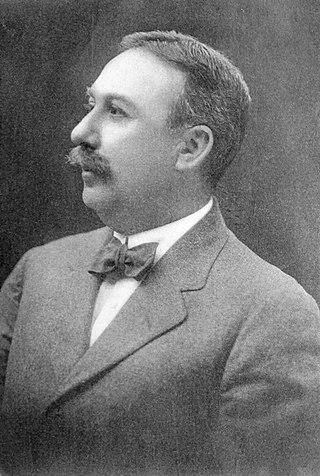
Edwin Stanton Porter was an American film pioneer, most famous as a producer, director, studio manager and cinematographer with the Edison Manufacturing Company and the Famous Players Film Company. Of over 250 films created by Porter, his most important include What Happened on Twenty-third Street, New York City (1901), Jack and the Beanstalk (1902), Life of an American Fireman (1903), The Great Train Robbery (1903), The European Rest Cure (1904), The Kleptomaniac (1905), Life of a Cowboy (1906), Rescued from an Eagle's Nest (1908), and The Prisoner of Zenda (1913).

Rupert of Hentzau is a sequel by Anthony Hope to The Prisoner of Zenda, written in 1895 but not published in book form until 1898.
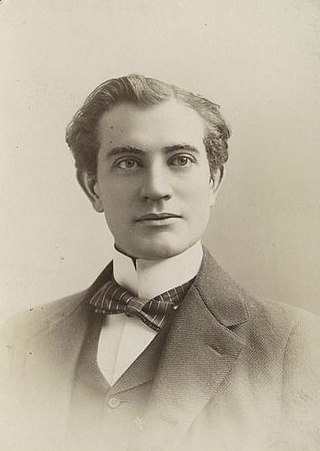
James Keteltas Hackett was an American actor and manager.
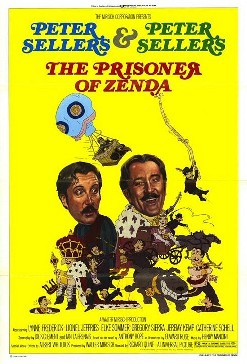
The Prisoner of Zenda is a 1979 American comedy film directed by Richard Quine that stars Peter Sellers, Lynne Frederick, Lionel Jeffries, Elke Sommer, Gregory Sierra, Jeremy Kemp, and Catherine Schell. It is adapted from the 1894 adventure novel by Anthony Hope. The novel tells the story of a man who has to impersonate a king, whom he closely resembles, when the king is abducted by enemies on the eve of his coronation.

The Prisoner of Zenda is a 1937 American black-and-white adventure film based on Anthony Hope's 1894 novel of the same name and the 1896 play. A lookalike has to step in when his royal distant relative is kidnapped to prevent his coronation. This version is widely considered the best of the many film adaptations of the novel and play.
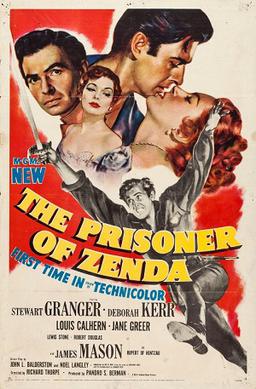
The Prisoner of Zenda is a 1952 American Technicolor adventure film version of the 1894 novel of the same name by Anthony Hope and a remake of the 1937 sound version and the 1922 silent. This first color version, made by Loew's and Metro-Goldwyn-Mayer, was directed by Richard Thorpe and produced by Pandro S. Berman. The film stars Stewart Granger, Deborah Kerr, and James Mason, with Louis Calhern, Robert Douglas, Jane Greer, and Robert Coote in supporting roles.
The Prisoner of Zenda is an 1894 adventure novel by Anthony Hope.

The Prisoner of Zenda is a 1922 American silent adventure film directed by Rex Ingram, one of the many adaptations of Anthony Hope's popular 1894 novel The Prisoner of Zenda and the subsequent 1896 play by Hope and Edward Rose.

Rupert of Hentzau is a 1915 British adventure film of the silent era. It was directed by George Loane Tucker and starred Henry Ainley, Jane Gail and Gerald Ames. It was based on the 1898 novel Rupert of Hentzau by Anthony Hope, the sequel to The Prisoner of Zenda (1894). It tells the story of the journey of an Englishmen to Ruritania in Eastern Europe where he is forced to impersonate a King to thwart the plans of a villainous aristocrat Rupert of Hentzau.

A Good Little Devil is a 1914 silent film starring Mary Pickford, produced by Adolph Zukor and Daniel Frohman, and distributed on a 'State's Rights' basis. It was Pickford's first feature-length film.

In the Bishop's Carriage is a 1913 American silent drama film produced by Famous Players Film Company film company and starring Mary Pickford. It is based on the novel of the same name by Miriam Michelson. This film is lost.

The Dictator is a 1915 American silent comedy film directed by Oscar Eagle and reputedly Edwin S. Porter. It was based on a play The Dictator by Richard Harding Davis and produced by Adolph Zukor and the Charles Frohman Company. John Barrymore stars in a role played on the stage by William Collier, Sr. whose company Barrymore had performed in this play. The film was rereleased on April 13, 1919 as part of the Paramount "Success Series" of their early screen successes. The story was refilmed in 1922 as The Dictator starring Wallace Reid. Today both films are lost.

Jim the Penman is a 1915 silent film crime drama produced by the Famous Players Film Company and released through Paramount Pictures. It was the first movie based on a well-known stage play, Jim the Penman by Charles Lawrence Young, about a forger in Victorian Britain. The film was directed by Edwin S. Porter and starred stage actor John B. Mason, in his debut film, in line with Adolph Zukor's efforts to recruit famous stage actors for films. Co-starring with Mason was the young up-and-coming favorite Harold Lockwood. Mason had played the part on the stage in the 1910 season on Broadway.

His Neighbor's Wife is a 1913 silent short film directed by Edwin S. Porter and starring Victorian actress and celebrity Lillie Langtry in her only feature screen appearance. It was produced by Adolph Zukor's Famous Players Film Company and distributed on a State's Rights basis.

The Count of Monte Cristo is a 1913 silent film adventure directed by Joseph A. Golden and Edwin S. Porter based on Alexandre Dumas' 1844 novel of the same name. It starred James O'Neill, a stage actor and father of playwright Eugene O'Neill. James O'Neill had been playing Edmond Dantès most of his adult life and was famous in the role. Daniel Frohman and Adolph Zukor produced together. Edwin S. Porter co-directed with Joseph Golden, though this was probably necessary as Porter also served as the film's cinematographer. The film was released on November 1, 1913.
The Pride of Jennico is a lost 1914 silent swashbuckler film directed by J. Searle Dawley. It was produced by Adolph Zukor and released on a State Rights basis. On the Broadway stage, the play starred James K. Hackett, Bertha Galland and Arthur Hoops.
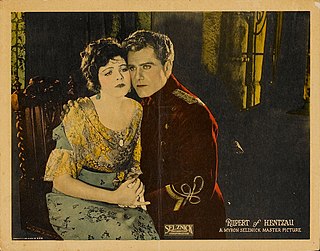
Rupert of Hentzau is a 1923 American silent adventure film directed by Victor Heerman and starring Bert Lytell, Elaine Hammerstein, and Lew Cody. It is an adaptation of Anthony Hope's 1898 novel Rupert of Hentzau, the sequel to The Prisoner of Zenda.

Beatrice Mary Beckley was an English-born American actress of stage and screen.
References
- 1 2 "The Prisoner of Zenda (1913)". silentera.com. Retrieved May 31, 2014.
- ↑ Gabler, Neal (1988). An Empire of Their Own. New York, NY: Doubleday. p. 31.